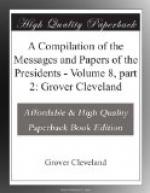We should be more prompt and anxious because they are weak and we are strong. In my judgment we should be liberal to the verge of lavishness in the expenditure of our money to improve their condition, so that they and all others may know that, although, like all nations and all men, we may do wrong, we are willing to make ample reparation.
The report of the commission appointed by me, of which General Crook was chairman, and the testimony taken by them and their investigations, add very little to what was already contained in the official reports of the Secretary of the Interior and the report of the Senate committee touching the injustice done to the Poncas by their removal to the Indian Territory. Happily, however, the evidence reported by the commission and their recommendations point out conclusively the true measures of redress which the Government of the United States ought now to adopt.
The commission in their conclusions omit to state the important facts as to the present condition of the Poncas in the Indian Territory, but the evidence they have reported shows clearly and conclusively that the Poncas now residing in that Territory, 521 in number, are satisfied with their new homes; that they are healthy, comfortable, and contented, and that they have freely and firmly decided to adhere to the choice announced in their letter of October 25, 1880, and in the declaration of December 27, 1880, to remain in the Indian Territory and not to return to Dakota.
The evidence reported also shows that the fragment of the Ponca tribe—perhaps 150 in number—which is still in Dakota and Nebraska prefer to remain on their old reservation.
In view of these facts I am convinced that the recommendations of the commission, together with the declaration of the chiefs of December last, if substantially followed, will afford a solution of the Ponca question which is consistent with the wishes and interests of both branches of the tribe, with the settled Indian policy of the Government, and, as nearly as is now practicable, with the demands of justice.
Our general Indian policy for the future should embrace the following leading ideas:
1. The Indians should be prepared for citizenship by giving to their young of both sexes that industrial and general education which is required to enable them to be self-supporting and capable of self-protection in a civilized community.
2. Lands should be allotted to the Indians in severalty, inalienable for a certain period.
3. The Indians should have a fair compensation for their lands not required for individual allotments, the amount to be invested, with suitable safeguards, for their benefit.
4. With these prerequisites secured, the Indians should be made citizens and invested with the rights and charged with the responsibilities of citizenship.




